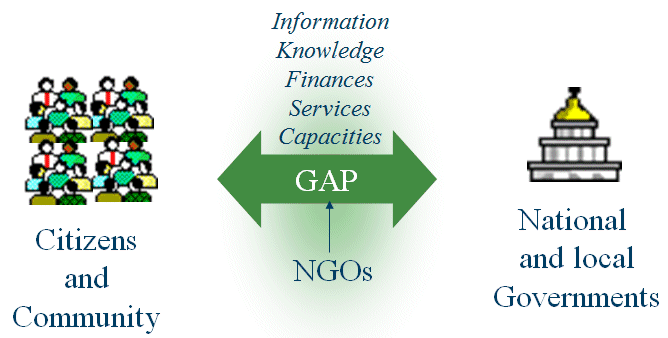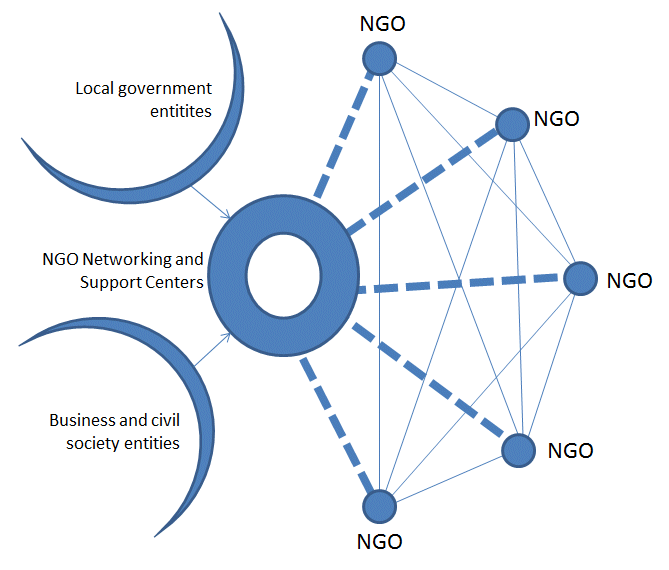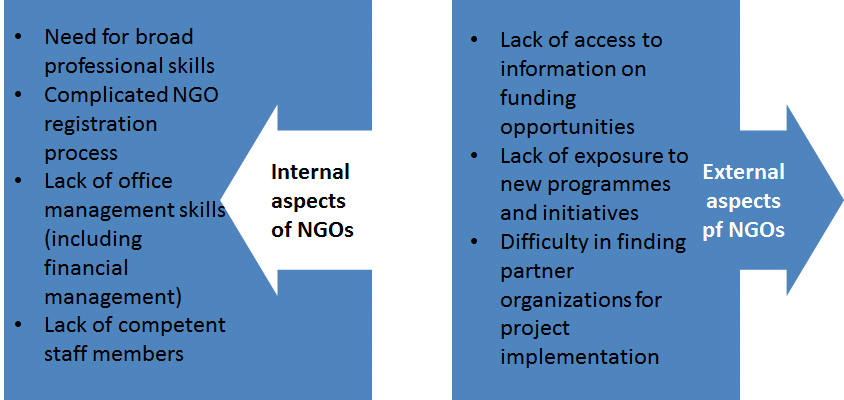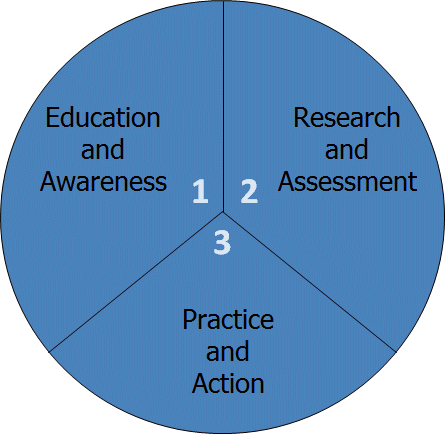An NGO for NGOs:
Networking and Support Centers for NGOs
| Hari Srinivas | |
| Case Study Series E-105. June 2016 [Updated March 2021]. |

Non-governmental organizations (NGOs) [1], in various forms and definitions, have been filling the gaps in delivery of public services by governments, particularly in developing countries [Figure 1]. This includes information, knowledge, finances, services, capacities etc.
Targeting basic needs of low-income households, NGOs have implemented programmes on a wide variety of themes, including housing, education, health, and skill development.
|
Box 1: Estimates of Number of NGOs
World Bank, Economist
|
But the NGO sector has been growing exponentially over the last few decades [Box 1]. This is evident in the increase in number of NGOs (based on number of registrations with relevant agencies), in organizational size (in terms of working staff, both full-time, volunteers and members), in level of functioning (from global and national to local and community, in themes (a myriad of development themes, many directly related to the SDGs), in target types (especially local communities and low-income households) etc.
As a result of this expansion, focus has shifted to the shortcomings and problems faced by NGOs themselves, and to find ways and means to overcome them.

Figure 1: NGO's "gap-filling" Role in Development
As more and more groups of people decide to set up NGOs, they have begun to face a twin dilemma: (a) building capacity and skills internally, and (b) ensuring and enabling trust and accountability externally.
Recognizing these dilemma, and of the importance of NGOs themselves, donor agencies and governments have begun to set up networking and support centers in order to assist NGOs overcome their shortcomings and provide better services to the communities they work in. Such centers are being set up in both OECD and developing countries to assist NGOs working in the respective countries.
The observations presented in this document are based on examples from such centers set up in Japan for Japanese NGOs [2]. A number of these centers, set up in the prefectures of Hyogo, Osaka, Tokyo, Kyushu and other prefectures were surveyed to distill the key points presented below. The lessons learnt have implications for other countries as well, particularly for NGOs in developing countries.
Internationally, bilateral, international and UN agencies have also assisted NGOs better understand how they work, and how NGOs can assist them in their programmes. Such 'NGO liaison offices' help NGOs to network with each other, as well as play a more significant role in global affairs, and at global levels.
While individual UN agencies and international organizations such as UNESCO, UNDP, UNEP or the World Bank and other regional development banks, have their own NGO liaison department, there is alsothe UN Non Governmental Liaison Service (UN-NGLS)that also supports NGOs - It is an inter-agency programme of the United Nations mandated to strengthen relations between the United Nations and civil society organizations. Such mechanisms allow NGOs, called "major groups" within the UN [Box 2], to play a more active and involved role in global affairs.
|
Box 2: "Major Groups" in the United Nations
Besides national governments, the UN works with a number of other stakeholders collectively called "Major Groups". Major Groups in the UN include:
UN Commission on Sustainable Development
|
Besides UN and other international organizations, national and local governments have also set up NGO networking and support centers to increase the range and types of services provided by NGOs to local communities. In some cases, such support centers may be an NGO itself, helping other NGOsor a business consultancy that, for example, helps NGOs in the legal registration process or obtain tax-exempt status.
Several multi-national companies (for example, Japanese companies such as Sony or Panasonic) have set up philantrophic foundations that proide funds and training in business management akilla nd other resources directly to NGOs.
1. Why Networking?
Why have such centers focused on the need for NGO networking? It is essentially to provide NGOs with a variety of up-to-date and pertinent information. Networking activities support the NGO's own activities, and facilitates linkages with other organizations in other sectors, including government agencies.
Networking also assists NGOs in administrative, financial and legal problems that they may have. Ultimately, networking enable NGOs to develop more effective and innovative programmes and projects.

Figure 2: Position of NGO Networking and Support Centers
As illustrated in Figure 2, the support centers lie in between local/national governments and business entities on one hand, and NGOs themselves on the other. They provide assistance and serices directly to NGOs and also help them to network and learn from each other.
2. What are the shortcomings addressed by the Centers?
Networking resources and opportunities address key shortcomings in NGOs. For example, some NGOs do not know the procedures to carry out activities on a particular theme or in a particular country. Many are not aware what other NGOs and aid agencies are doing in the same field or country, or funding opportunities available for NGOs..
As outlined in Figure 3, NGOs face a number of internal and external challenges in their operations. These can be internal to an NGO, for example, need for broad professional skills, NGO registration processes etc. and external to an NGO, including for example, access to information and funding opportunities ir exposure to new programmes and initiatives.

Figure 3: Internal and External Challenges in NGO Operations
Despite a keen willingness to work and having the resources to do so, some NGOs are many times not aware of the key areas of priority for action that they need to focus on, and need assistance in this matter. NGOs have also expressed the need for opportunities in networking and cooperative activities with other NGOs, which are lacking at present. For example, governments of both Singapore and Tokyo have provided working office spaces for NGOs to set themselves up, including providing common services such as meeting spaces and printing services.
3. How does a NGO Support Center help?
In order to address the needs and shortcomings mentioned above, NGO networking and support centers undertake a number of actions to support NGO activities. These can be broadly categorized into three types, (1) education and awareness, (2) research and assessment, and (3) practice and action.

Figure 4: Three Types of Support for NGOs
Examples of activities of such support centers include:
- Providing information on a wide variety of issues and topics
- Assisting in project formulation and implementation
- Helping in organization of seminars and workshops
- Organizing exhibitions and fairs
- Facilitating idea exchange
- Arranging meetings with other stakeholders/partners
- Sharing resource persons
- Building capacity through training
- Publishing reports, newsletters and websites.
While most of the NGO networking and support centers have been set up by local and sub-national governments, quite a few have been set up by NGOs themselves for boarder purposes such as building credibility and trust with the civil society.
There is also an increasing trend of NGOs being set up for the express purpose of helping other NGOs to be set up and carry out their work. These include, for example, NGOs that help other NGOs to:
- register and set themselves up
- understand accounting and tax laws
- streamline operational and project management
- assist in fund raising
- Local governments setting up NGOs (called 'GONGO' - a government-organized NGO) in order to help local interest groups or citizens groups to register themselves as NGOs and carry out their activities. Such GONGOs may also help in channelling public funds to NGOs to implement public programmes.
- Consultancies, particularly legal experts who help for-profit business to startup, also setting up "social enterprises" as non-profits to help NGOs start off (for exampl, registering with local governments and tax authorities.
- National governments, particularly ministries of foreign affairs (including bilateral agencies such as JICA) helping set up NGOs in order to channel official development aid to developing countries through these NGOs.
- Large multinational companies set up non-profit foundations (tcalled a 'BONGO' - business-organized NGO) that help other NGOs in developing good business skills, raise funds, etc.
- help in officially registering the NGO. This is usually a complicated process needing a multitude of application forms and involving different government agencies
- help in writing proposals and apply for government funds and other processes
- provide training in Programme and project management and related skills
The setting up of networking and support centers for NGOs as a public service have first and foremost highlighted and acknowledged the importance of NGOs in societal development. Such centers have also helped NGOs
- (a) internally, to be more efficient and effective in their programmes and projects, and
- (b) externally, to benefit from better access to various resources and collective sharing of programme outcomes.
By providing services to NGOs collectively, such centers have also helped save costs for NGOs (for example, in providing meeting spaces for seminars/conferences) and increased the publicity they have received for their projects (for example, by including NGO project info in the center's newsletters or websites).
End Notes:
| [1] | In this document, the term 'NGO' - non-governmental organization - is used in a generic sense, and includes its variations such as NPO - non-profit organization - that is in use in Japan and elsewhere. A number of NPO support organizations in Japan were studied to prepare this document. |
| [2] | The organizations studied to develop this document, besides GDRC itself, included:
|
|
|

Return to the NGO Page
Comments and suggestions:
Hari Srinivas - hsrinivas@gdrc.org
